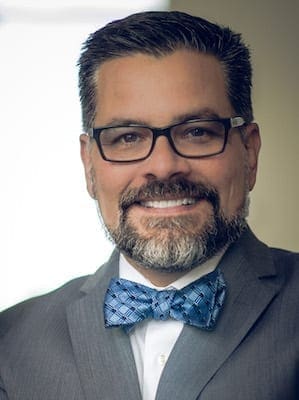Let me begin this way: I am both welcoming and affirming of LGBTQ people.
I have come to the conclusion that God created humanity with various sexual identities and orientations. Therefore, the church should not hinder LGBTQ Christians from full inclusion into the body as God made them.
However, I must also admit, I have not always held this conviction.
As a young Christian growing up in eastern Oklahoma, I was raised a good Southern Baptist. With the rise of the Evangelical Right in the 1980s, I also was influenced by their restrictive theology and political ideology.
I was taught that God created Adam and Eve, not Adam and Steve. Furthermore, I was instructed that marriage was between a man and woman with assigned roles granted to each. The husband was to be the head of his wife, and she was to submit herself to his authority.
In addition, marriage had two main purposes: (1) it was not good for man to be alone so God created a helper, and (2) marriage was meant for procreation.
Love was not mentioned a lot in the sermons and lessons I heard growing up; just the “right” equation to secure favor with God.
These beliefs stayed with me until I arrived at Southwestern Baptist Theological Seminary in Fort Worth, Texas.
Now, I know what you must be thinking: “The Southwestern where Paige Patterson was president and started a degree track for pastors’ wives that emphasized taking care of the home and raising children?”
Yes, I mean that very one. However, it was a different place when I attended.
During my first week on campus, I gathered with my fellow students in the chapel for the annual consecration address.
The address was delivered by a professor at the beginning of each academic year. On this particular year, Dr. Boo Heflin was chosen to offer the sermon.
Dr. Heflin was an Old Testament professor from the hills of Arkansas who stood a little over 5-foot-4. When standing behind the pulpit, he reminded me of Bilbo Baggins standing before the dragon.
However, as he began to speak, I quickly realized the dragon had no chance. His chosen topic was the correct response from the church regarding egalitarianism.
Dr. Heflin went through all the verses I had been given as a youth to emphasize a patriarchal theology of sexuality and marriage.
One by one, he challenged my worldview when it came to the role of women in marriage and in the church.
However, what struck me most was his concluding story about a young woman who came to visit with him about a calling to pastoral ministry.
Dr. Heflin said he gently attempted to stir her another way, knowing the path would be difficult for her in Southern Baptist life. After she left, he felt conflicted and convicted about his advice to her.
He knew he affirmed egalitarian views and women pastors, but he had just advised a young female according to the denominational reality of his era.
In a blink of an eye, God spoke to him: “Boo, who are you to tell me who I can and who I cannot call?”
On that warm September day in Fort Worth, Dr. Heflin taught me the most valuable lesson I have ever been taught as a Christian: While the Bible is sacred and authoritative for Christians, human interpretation must never be canonized over the living Word of God.
Humans have a tendency to interpret the Bible through anthropocentric lenses, which perpetuate previously codified orthodoxies established by the powerful. In other words, we interpret the Bible in ways that favor the powerful establishment.
Therefore, as serious students of the Bible, we should set aside our predetermined interpretations based on often-unrecognized presuppositions in order for God to speak to us anew.
If we allow ourselves to be open to God’s Spirit revealing God’s will to us, then we might learn something more significant about God. We might be able to expand our minds. And, we might be about to expand God’s community.
This was the case in the first century when the church made the decision to permit Gentiles into their community.
The Jewish establishment that was inspired by Jesus felt like Gentiles needed to convert to their faith first by being circumcised.
However, Paul argued fervently that God’s love was for everyone, not just those with a mark on the body.
Peter, the leader of the church, had to be convinced. He was a traditionalist at heart.
However, after a period of time, he came around to Paul’s interpretation. In fact, carefully listen to his words in Acts 11:17, “If then God gave them the same gift that he gave us when we believed in the Lord Jesus Christ, who was I that I could hinder God?”
Peter and Dr. Heflin taught me that when God acts in the world, disciples have an important decision to make: We can fight the Spirit or follow it.
Even when we think an interpretation of the Bible is correct for an extended period of time, it does not mean we were correct.
We must always be open for correction and new possibilities of God’s revelation to manifest itself in the world.
This brings me to my belief that LGBTQ Christians should be both welcomed and affirmed by the church.
Other scholars, ministers and students have eloquently addressed and exegeted the biblical texts often cited as a prohibition against homosexual relationships.
I would point to previous articles at EthicsDaily.com, David Gushee’s 2014 article series at Baptist News Global and Matthew Vines’ “God and the Gay Christian” for further research.
The purpose of my column is to tell you about my journey.
As a young pastor, I struggled with the strict exclusionary parts of my faith. As a Native American, I knew from firsthand accounts from my great-grandparents how Christianity was used to assimilate them into a white culture.
It often felt like Christian evangelism was more about converting to a European way of life than it was about the love of God.
With this notion as a backdrop and with my eyes opened by Dr. Heflin, I began a journey to understand the limitless love of God.
As a young pastor after seminary, I began having LGBTQ Christians and their relatives visit me. Time and time again, I heard the same story.
Individuals would say: “I did not choose this for myself. Believe me, if I could change, I would. I have known I am gay ever since I can remember.”
From relatives: “I know my son or daughter. I love them. I believe them when they tell me about what they are experiencing. However, my understanding of the Bible and what they tell me are at conflict. Please, I need help.”
For a time, I had no words that could help, except, “I promise to pray for your family.”
Then, one day, after another conversation with an LGBTQ Christian, the question posed by Peter and Dr. Heflin hit me like a ton of bricks: “Who was I that I could hinder God?”
If God was calling more and more LGBTQ disciples into the church, who am I to prevent it? Did they have to convert to a certain interpretation like the Gentiles were forced to do? Was the church going to force yet another group of people to wear a “mark on the body” to enter into their community? Was not a “mark on the heart” enough?
In the end, I decided I was going to stop fighting with God about God’s LGBTQ children.
Each time I have studied Scripture and opened my mind to God’s voice, I have always discovered that God wants more and more people to experience love.
Whoever the person was that I tried to exclude from God’s love using my prescribed spiritual formula, God always told me to set that formula aside because it was wrong.
God wanted to show me the formula God had been using since the beginning of time that goes something like this: God equals love, as love equals everyone.
It’s been a long journey for me, so I’m sympathetic to those who are still where I was entering seminary and those who find themselves somewhere along the path I’ve journeyed down.
This decision has hindered my career path at times, as doors were closed in my face.
Even today, as some read this, they will cry “heretic” and argue that I have abandoned the faith and ignored the Bible.
However, my belief in the full inclusion of LGBTQ Christians into the church is because of the Bible, not in spite of it.
My conviction is rooted deeply in Scripture, as God is always expanding love even while some followers attempt to keep it for themselves.
Therefore, if I am ever in error with my interpretation of Scripture, then I have made a conscious decision to err on the side of love.
If I get to the pearly gates one day, I hope I get to hear God say, “Darn it, Mitch, you took my message about love way too seriously. When I said I loved everyone, I really did not mean everyone. I’m sorry, but you loved way too much!”
If I hear that from God, I bet it’s said with a smirk and a wink.


